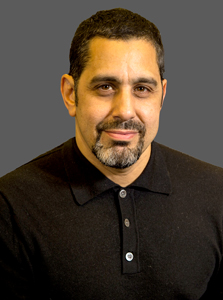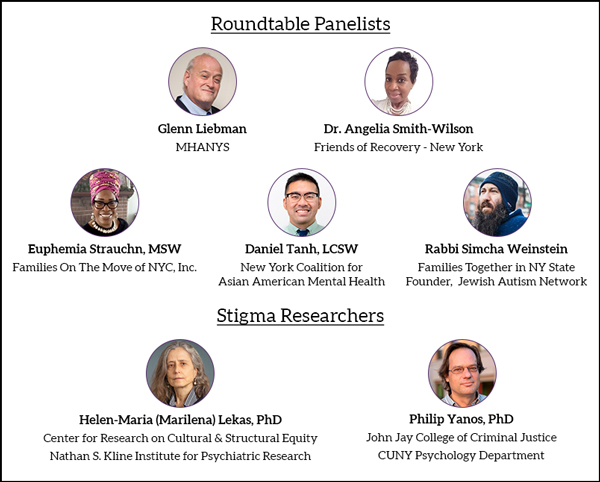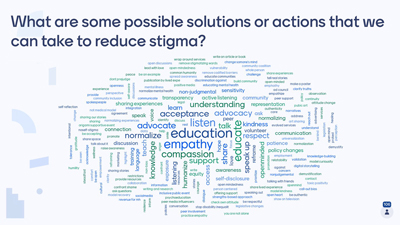• Roundtable 1: Understanding the Experience of Mental Health Stigma
• Roundtable 2: The Experience of Mental Health Stigma Among Diverse Groups
• Roundtable 3: The Role of the Media in Reducing Stigma
• Roundtable 4: Paths to Reduce Stigma and Promote Positive Attitudes, Beliefs, and Behavior
This 90-minute virtual roundtable discussion will focus on the work of community-based organizations and advocacy groups to identify and implement strategies to promote social inclusion, reduce mental health stigma, and/or mitigate its negative impact in the lives of people with mental illness. This roundtable, facilitated by a psychologist, will educate attendees about effective strategies to reduce the harmful effects of stigma on multiple levels, including, but not limited to, personal and structural stigma.
Roundtable Facilitator – James Rodriguez, LCSW, PhD

Dr. James Rodriguez
Dr. James Rodriguez is a New York State Licensed Clinical Social Worker and Psychologist in private practice with over 25 years of experience as a direct practitioner, trainer, and researcher in mental health services to children, youth, adults, and families. He is the Senior Director of Clinical Initiatives at the McSilver Institute for Poverty Policy and Research and Adjunct Faculty at the NYU Silver School of Social Work.

Roundtable Panelists (click for details)
Glenn Liebman has been CEO of the Mental Health Association in New York State, Inc. (MHANYS) since 2004. MHANYS is a member-driven organization with 26 affiliates in 50 counties throughout New York State, dedicated to educating the public about mental illness and mental health while advocating for positive transformation of the mental health system and reducing the stigma surrounding mental health.
During Mr. Liebman’s tenure, MHANYS has been instrumental in the implementation of several important initiatives including Mental Health Parity (Timothy’s Law), Mental Health Education in School (New York being the first in the nation to have this mandated), Enhancement of Community Based Mental Health Services, Mental Health Public Awareness, Criminal Justice Reform, Workforce and many other public policy reforms. MHANYS has also been recently named among the Top 10 Mental Health Leaders in City and State’s publication.
Prior to joining MHANYS, Mr. Liebman served as Program Director of Adult Home Initiatives at the New York State Department of Health, Project Director at the New York State Office of Mental Health, Executive Director of the Alliance for the Mentally Ill of New York State (now NAMI-NYS), and as a Confidential Assistant in the administration of Governor Mario Cuomo. Mr. Liebman was also a freelance sports writer for several years.
Mr. Liebman serves as a member of the New York State Justice Center Advisory Committee, the New York State Geriatric Mental Health Council and was a member of the Governor’s Medicaid Redesign Team on Social Determinants of Health. He currently serves as chair for New York State’s Behavioral Health Advisory Council (BHAC).
Mr. Liebman has received policy awards from several organizations and is the first recipient of the New York State Senate Thomas P. Morahan Leadership Award in Mental Health and Developmental Disabilities.
Mr. Liebman was honored as one of City and State’s Top 50 Health Care Executives in New York State from 2019 through 2021.
He lives with his wife and son in Albany, New York.
Dr. Smith-Wilson brings over 20 years of human service and addiction experience to Friends of Recovery-New York. Angelia’s career spans across working with human service agencies that have served individuals with mental health, substance use, residential, and homeless issues. She has worked as an intensive case manager, a primary therapist, a director of client services and eventually progressing to level of vice president throughout the greater Rochester area.
Angelia has centered her career around improving treatment outcomes for those in recovery, as well as exploring research designed at substance use counselor development. Her doctoral dissertation, entitled, “Examining the Relationship between the Substance Abuse Counselor Knowledge of the Models of Disability and their self-assessment of cultural competence working with the Deaf Sign Language User,” afforded her the opportunity to learn and study addictions from the counselor’s perspective.
Dr. Smith-Wilson has a B.S. in Psychology from SUNY Brockport, Master of Social Work from Roberts Wesleyan College and a Doctorate in Education from St. John Fisher College. Dr. Smith-Wilson is adjunct faculty at the School of Social Welfare, Graduate MSW Program, University of Albany, where she teaches Macro Practice Social Work in the MSW program and a variety of undergraduate courses.
Angelia is currently a member of Black Faces, Black Voices, and on the CAPRRS Advisory Committee for Faces and Voices of Recovery.
Euphemia Strauchn is a founding member and CEO of the grassroots family run agency Families On The Move of NYC, Inc. She grew up in a home and neighborhood in which mental health awareness was necessary. Her mother, brother, seven neighbors, herself, and later three of her children received mental health services. Hearing offensive comments about people because of their mental health status was hurtful. The jokes made by people who did not understand mental illness, and words of hopelessness by therapists and psychiatrists were further traumatizing. These early memories taught Euphemia the painful, long-lasting effects of mental health stigma firsthand.
Having experienced how dehumanizing stigma can be, Euphemia determined that she would never make anyone feel hopeless or less than because of their mental health status. Committed to providing supportive services to families like hers, and those of her childhood neighbors, in an environment that is welcoming, non-stigmatizing, and that did not criticize or blame. With the support of leaders from the Children’s Division of State Office of Mental Health Field Office (OMH), and local Department of Health and Mental Hygiene (DOHMH), Euphemia, leaders in the Family Support Movement, and advocates from the five boroughs, worked together, and formed Families On The Move of NYC, Inc. through the 2002 NYC System of Care Grant (SOC).
Euphemia presented at conferences on local and national platforms and panels. She has served on numerous committees including the Governor’s Task Force, and most recently the Behavioral Health Advisory Committees, the Administration for Children and Families (ACS) Family and Youth Justice RAPC Committee, and currently serves on the Juvenile Justice Advisory Committee, Justice Center Advisory Committee, United Health Fund PEDS Board of Advisors, and the DOHMH Stakeholder Advisory Committee, the Staten Island Child and Adolescent Mental Health Services Committee, and others representing family voice.
Euphemia has an MSW, is Certified in Health and Mental Health Christian Counseling, Medical Billing and Coding, and is a Credentialed Family Development Worker/Instructor. Over her twenty-six years in the Family Support Movement, she has served as a Co-Project Director, Training Director, Director of Cultural Competency, Family Support/Engagement Specialist, and Co-Chaired the OMH Citywide Coordinated Children’s Services Initiative Committee for the NYC System of Care Grant. She provides technical assistance on local and national levels and was a consultant in the development of NYS Parent Empowerment Project (PEP), instrumental in the restructuring of the NYC DOHMH Parent Resource Centers into the Family Support Programs. Euphemia conducted site visits for SOC communities nationally through SAMHSA. She has facilitated training in Youth and Adult Mental Health First Aid, CCAR Peer Recovery Coach, Trauma Informed Care 2.0, Recovery 101, Anger Management and Parenting Train the Trainer, and Engaging Families. In addition, she developed two Family Strengthening Programs for SAMHSA grants in NYC.
Euphemia works to educate people about mental health to reduce beliefs that contribute to stigma. She promotes hope, person first language, individualized person-centered care, cultural responsiveness, resiliency, recovery, “nothing about us without us.”
Euphemia is the mother of four, has twenty-two grandchildren and one great grandchild.
Daniel Tanh, LCSW, is originally from Philadelphia and currently resides in Brooklyn. He is a licensed clinical social worker who brings compassion and insight from partnering with youth, families, and adults through his experiences in after-school programs, summer camps, various community mental health programs, and in his own private practice. Drawing from his identity as an English- and Teochew Chinese-speaking Asian American son of refugee parents who escaped the Cambodian genocide, his strategies hone in on the ways that societal ideologies, community institutions, interpersonal interactions, and internalized beliefs can prevent or promote individual and community prosperity and health. He believes that mental health is about overall wellness and incorporates social justice as part of his social work and behavioral health practices, consulting services, and community activism. He was most recently the Team Director and Primary Clinician of an OnTrackNY team which supports individuals experiencing first-episode psychosis at the Jewish Board, where he was also a leader within the agency’s Confronting Structural Racism (COR) initiative. He continues his community-building efforts within his current role as an Executive Committee of the New York Coalition for Asian American Mental Health, where he co-founded NYC’s first peer supervision group for Asian American mental health and community wellness professionals. He is also the Assistant Director of Learning Innovation at New York University’s McSilver Institute for Poverty Policy and Research, where he supports the training, technical assistance, and growth needs of the New York mental health workforce.
Simcha Weinstein is an internationally known author and leader on disability inclusion, autism, and neurodiversity. He has appeared on CNN and NPR and has been profiled in leading publications, including the New York Times, Miami Herald, and London Guardian. A syndicated columnist, he writes for Tablet Magazine, the Royal Shakespeare Company, Condé Nast, and many other agencies. He chairs the Religious Affairs Committee at Pratt Institute, the renowned New York art school. He was recently voted “New York’s Hippest Rabbi” by PBS affiliate Channel 13. He is the DEI coordinator at Families Together in NYS and is the Founder of the Jewish Autism Network
Stigma Researchers (click for details)
Helen-Maria (Marilena) Lekas, PhD joined the Nathan S. Kline Institute in 2016 as a Research Scientist in the Division of Social Solutions and Services Research, and as Co-Director of CCASE (Center for Research on Cultural and Structural Equity) http://ccase.org/about-us/vision/. She is an Associate Professor, Department of Psychiatry, NYU Grossman School of Medicine. She earned a Ph.D. in Sociology from Columbia University and served as an Associate Professor at Mailman School of Public Health and built a 13-year NIH-funded research portfolio on infectious and chronic diseases in low-income and racialized communities. Engagement in medical care, patient-provider relationships, intersectional stigma, symptom interpretation and illness management in persons with behavioral health needs makeup her research agenda. Her projects are based on using applied, theory-driven research methods. Most recently, Dr. Lekas has developed a cultural and structural competence training for the peer advocate mental health workforce and is collaborating on a large-scale stigma-reducing initiative led by the Office of Mental Health of NYS. For a list of publications: https://med.nyu.edu/faculty/helen-maria-lekas
Philip T. Yanos, Ph.D., is native New Yorker and proud Greek-American. He is a professor of psychology at John Jay College and the Graduate Center, City University of New York. A researcher who focuses on stigma and how it interferes with recovery among people diagnosed with mental illnesses, he is the author of Written Off: Mental Health Stigma and the Loss of Human Potential (Cambridge University Press, 2018) and associate editor for the journal Stigma and Health. He is the co-developer of Narrative Enhancement and Cognitive Therapy, a group-based treatment which addresses the effects of self-stigma among people diagnosed with mental illnesses that has been translated into several languages. He is the author of more than 100 articles and book chapters and has been principal investigator on several federally-funded research projects.
Related Articles
Meeting the Moment: Addressing the Challenges to Advance Solutions for Mental Health Clinical Trial Recruitment
Learn strategies to improve recruitment and retention in mental health clinical trials by addressing patient and operational challenges effectively.
What It’s Really Like Living with Bipolar Disorder
Discover what it’s really like living with bipolar disorder, from daily challenges and treatment to finding balance, support, and hope for recovery.
The “Good Son” Trap: How Role Conflict Between Parents and Partners Causes Burnout and Depression
How “good son” expectations can drive burnout, depression, and relationship strain for South Asian men—and why redefining duty supports mental health.
New York State Releases Landmark Maternal Mental Health Policy Roadmap
Explore New York’s strategies to improve maternal mental health, reduce stigma, and expand support for birthing persons across the state.
Roundtable 2 of 2: Maternal Mental Health Support Programs and Solutions to Overcome Stigma
Maternal Mental Health and Stigma Reduction webinar with evidence-based support programs, stigma strategies, and practical approaches for perinatal care.











